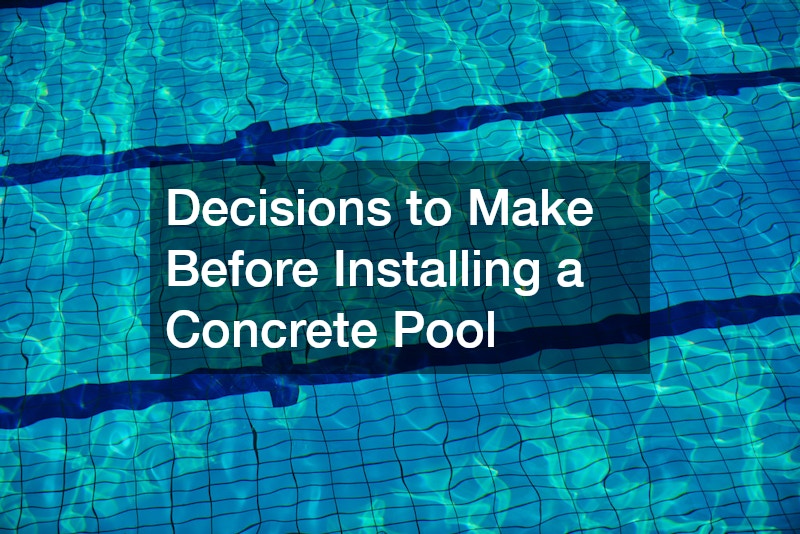Installing a concrete pool is a significant investment and decision that entails various considerations. Explore these key factors potential pool owners must deliberate upon to ensure a satisfactory outcome and a lasting addition to their home.
Initial Planning Considerations
When embarking on the journey of installing a concrete pool, one of the first steps involves thorough budget estimation. Understanding the financial commitment required ensures that potential pool owners are prepared for the investment.
Budgeting not only includes the initial outlay for construction but also incorporates long-term expenses such as maintenance and potential repairs. Allocating funds appropriately helps avoid any financial strain during the project.
Site selection plays a crucial role in the planning process. The chosen location needs to offer ample space while meeting local zoning and building regulations. It’s also wise to consider environmental factors such as sunlight exposure and wind patterns which can impact pool enjoyment and energy efficiency. Selecting a well-suited site lays the groundwork for a pool that complements the home’s aesthetic and functional needs.
Size and shape preferences significantly influence both the project’s complexity and its cost. A tailored shape can enhance the pool’s appeal, but it’s essential to ensure that it aligns with family needs and lifestyle. Larger pools come with increased construction costs and necessitate more maintenance. Therefore, striking a balance between aesthetic desires and practical considerations is key to a successful installation.
Selecting the Right Pool Builder
Choosing the right pool builder can make or break the success of your pool installation project. It is crucial to check credentials and verify that the builder is licensed and insured, ensuring adherence to industry standards. Credentials serve as a benchmark for professionalism and reliability, offering peace of mind throughout the construction process.
Analyzing past projects provides valuable insight into the builder’s capabilities and quality of work. Requesting to see a portfolio or visiting past installations, if possible, helps gauge their craftsmanship. Noting the diversity and complexity of previous projects can also indicate their preparedness to meet specific client demands, including custom designs and innovative features.
Personal consultations are vital in fostering a strong working relationship and understanding client needs. During these meetings, discussing expectations, timelines, and potential challenges ensures clarity and alignment between both parties. Ensuring open lines of communication throughout the project aids in the swift resolution of any issues, ultimately contributing to a smooth completion.
Design Features and Options to Consider
Concrete pools offer a vast array of design opportunities, allowing homeowners to craft a unique aquatic retreat. Pool lighting is one of the transformative features to enhance ambiance and safety during nighttime swimming. Options such as LED lighting and fiber optics can create stunning visual effects, making the pool an attractive focal point even after dark.
Water features add both auditory and aesthetic benefits, transforming a pool into a serene escape. Elements such as waterfalls, fountains, and jets can be tailored to complement the overall landscape design. These features not only elevate the visual appeal but can also contribute to a calm and relaxing atmosphere, enhancing the pool’s experience.
Deck designs are integral to how a pool integrates with the surrounding environment. Materials such as natural stone, wood, or tile can be used to achieve the desired aesthetic. Functional considerations, such as slip resistance and heat retention, should also guide the choice of decking material. An expertly designed deck extends the living space and enhances outdoor enjoyment.
Maintenance Requirements for Concrete Pools
Concrete pools demand a consistent maintenance routine to preserve their appearance and functionality. Regular cleaning is essential to prevent algae growth and keep the pool inviting. Utilizing the correct brushes and cleaning agents ensures the concrete surface remains pristine and free from damage.
Chemical balancing is a critical aspect of pool maintenance, ensuring water safety and comfort. Monitoring pH levels, chlorine content, and alkalinity is necessary to prevent bacterial growth and protect pool components. Investing in a quality testing kit and maintaining accurate records can streamline the chemical maintenance process.
Seasonal care needs, such as winterizing the pool and addressing any weather-related repairs, should not be overlooked. Protecting the pool during colder months prevents damage from freezing temperatures and extends its lifespan. Engaging with professionals for seasonal maintenance can guarantee that steps are performed correctly and effectively.
Installing a concrete pool involves numerous critical decisions to enhance satisfaction and ensure a valuable addition to any home. From the initial planning and selecting a qualified pool builder to understanding design features, maintenance needs, and comparing costs with other pool types, thorough research is indispensable. Each consideration contributes to realizing a pool that meets expectations and serves as a long-standing asset for enjoyment and relaxation.

